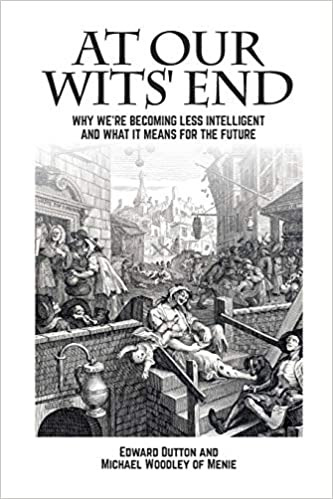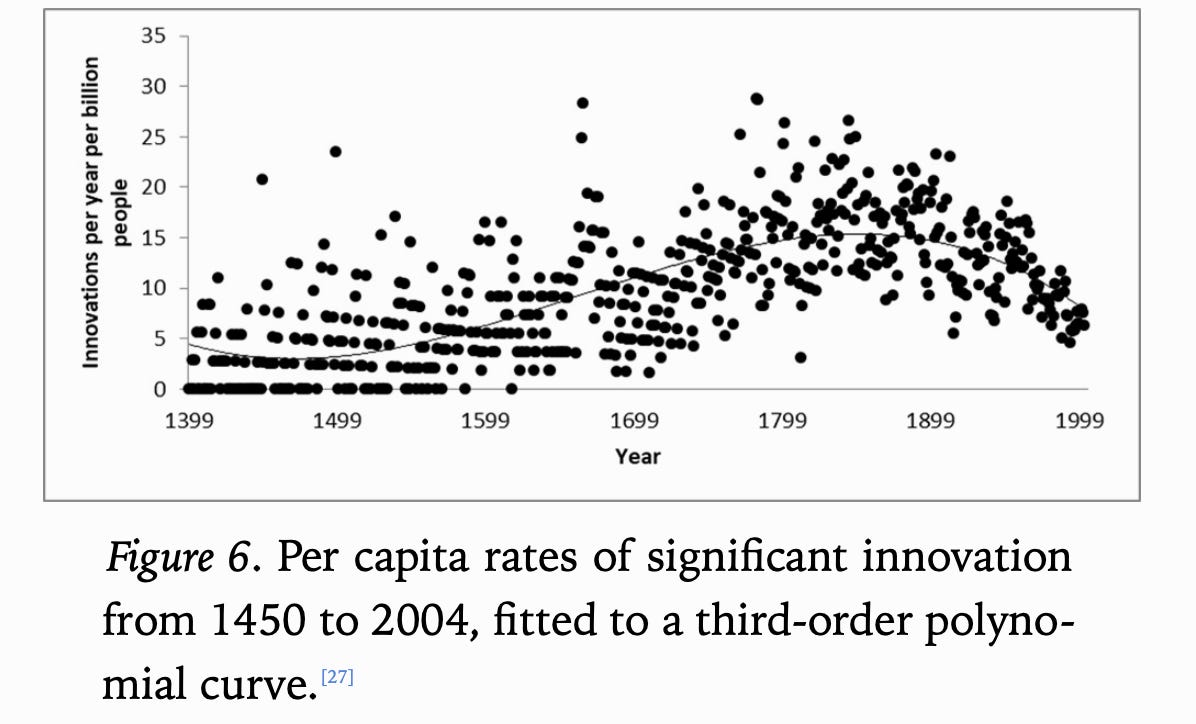My Favourite Parts From: At Our Wits' End: Why We're Becoming Less Intelligent And What It Means For The Future
Welcome to the second edition of My Favourite Parts From. This week we’re looking at Ed Dutton and Michael Woodley of Menie’s At Our Wits' End. As many of the books I read are replete with academic references, my personal style guide is to cite the source given but use the text from the book. Where necessary, I add a brief subtitle for clarity. I label the quotes in case you would like to discuss them in the comments.
A.
Between the 1400s and the mid-19th century, in every generation, the richer 50% of the population had more surviving children than the poorer 50%. As economic status and intelligence are positively correlated this led to us becoming more and more intelligent every generation
Reference: Clark, G. (2007) A Farewell to Alms: A Brief Economic History of the World, Princeton, NJ: Princeton University Press. Clark does not consider ‘intelligence’ as one of the traits that increased as a consequence of the ‘survival of the richest’, however this is what is entailed by the mass of evidence he cites.
B.
Higher IQ people are also more trusting. The relationship between intelligence and trust may result from the way in which less intelligent people will be less able to discern whether someone is trustworthy, meaning it would make more sense for them to trust nobody.
Reference: Carl, N. & Billari, F. (2014) Generalized trust and intelligence in the United States, PLOS ONE, 9, e91786.
C. Inbreeding versus outbreeding depression:
If they mate with someone too distant, then they will be passing on fewer of their genes than they could. Also more distantly related genes could combine in ways that may be harmful to the offspring (outbreeding depression). According to research from Iceland, the ‘sweet spot’ in terms of fertility, or producing the highest numbers of children, is your third cousin!
Reference: 38 Helgason, A., Palsson, S., Gudbjartsson, D., et al. (2008) An association between the kinship and fertility of human couples, Science, 319, pp. 813–816.
D.
Social mobility from relative poverty to wealth happened in all societies, and intelligence is a significant factor behind this mobility. In 1825, in England, 20% of men with working class fathers entered middle class professions.* It has been found that 31% of Chinese mandarins—civil servants, selected for their intelligence and diligence through competitive examination—between 1371 and 1904, came from ordinary backgrounds.**
References:
*Kaelble, H. (1985) Social Mobility in the 19th and 20th Centuries, Leamington Spa: Berg, p. 12
**Ho, P. (1959) Aspects of social mobility in China, 1368–1911, Comparative Studies in Sociology & History, 1, pp. 330–359
E.
The average Englishman is highly genetically similar to the next average Englishman relative to the average Dane, based on genetic assay data. The Australian political psychologist Frank Salter has calculated that if the world were divided between only English and Danes, then two average English people would have a kinship coefficient of 0.0021, whereas it would be zero for an Englishman and a Dane. This coefficient would be the equivalent of sharing a set of 6 x great grandparents; that is being 7th cousins. So, from a genetic perspective, it would be adaptive for an Englishman to fight to protect his ethnic group from Danes, even if it risked him having no children at all. If his actions saved enough of his people, this would more than compensate for the lack of direct breeding.* The soldier, who laid down his life in this way, would be operating at the level of group selection. Indeed, computer models have shown that the more ethnocentric group—the group whose members are more inclined to repel outsiders and make sacrifices for the good of the group—always eventually dominates in between-group competition, all else being equal.**
References:
*Salter, F. (2007) On Genetic Interests: Family, Ethnicity and Humanity in an Age of Mass Migration, New Brunswick, NJ: Transaction Publishers.
**E.g. Hammond, R. & Axelrod, R. (2006) The evolution of ethnocentric behaviour, Journal of Conflict Resolution, 50, pp. 1–11.
F. A possible declining trend for worldwide innovation
Reference: Huebner, J. (2005) A possible declining trend for worldwide innovation, Technological Forecasting & Social Change, 72, pp. 980–986.
G.
Focusing on long-term benefit claimants, Perkins cited research from the UK showing that every 3% rise in benefits leads to welfare claimants having approximately 1% more children. Indeed, Perkins notes that follow-up interviews found that benefits were a causal factor because claimants chose to discontinue contraception use in response to rises in benefits. This clearly implies that a generous welfare system encourages those of relatively low intelligence to increase their fertility. He notes large cohort studies, which demonstrate that increasing welfare generosity has resulted in increasing fertility among recipients in the UK.
Reference: Perkins, A. (2016) The Welfare Trait: How State Benefits Affect Personality, London: Palgrave Macmillan, p. 2, citing: Brewer, M., Ratcliffe, A. & Smith, S. (2012) Does welfare reform affect fertility? Evidence from the UK, Journal of Population Economics, 25, pp. 245–266.
H. sRT = simple reaction times
This replication study furthermore found, using sRTs, that the decline in g had been around 1 IQ point per decade between 1885 and the year 2004. That is about 10 points, in a century—and probably more over the past two hundred years. Dutton and Charlton have explained that, to put this in perspective, 15 points would be approximately the difference in average IQ between a low level security guard (85) and a police constable (100), or between a high school science teacher (115) and a biology professor at an elite university (130).* In other words, in terms of intelligence, the average Englishman from about 1850 would be in roughly the top 15% of the population in the year 2000—and the difference would be even larger if we extrapolated back further towards about 1800 when the Industrial Revolution began to initiate massive demographic changes in the British population.
Reference: Dutton, E. & Charlton, B. (2015) The Genius Famine, Buckingham: University of Buckingham Press, pp. 158–159
I. Shortly after H, there’s a quote from Dutton and Charlton’s The Genius Famine further contextualising what the decline in intelligence means:
the academics of the year 2000 were the school teachers of 1900, the school teachers of the year 2000 would have been the factory workers (the average people) of 1900, the office workers and policemen of the year 2000 were the farm labourers of 1900, those who were around 10 to 15 IQ points below average at that time. The low-level security guards and shop assistants of the year 2000 were probably in the workhouse, on the streets, or dead in 1900. The substantial long-term unemployed or unemployable, the dependent ‘underclass’ of the year 2000, simply didn’t exist in 1900. And even this estimate is ignoring the expansion of education since 1900, which expanded the middle class occupations and would, in itself, reduce the average intelligence of academics and teachers and even shop assistants in 2000 compared to what they would have been in 1900.
J.
Civilisations seem to follow a fairly predictable pattern. Low g, stressful, religious societies undergo group expansion and selection for g via downward social mobility. Eventually, they blossom into civilisations. However, civilisation reduces selection for g due to medicine, improved living conditions, and lower levels of stress leading to kindly attitudes to the poor. Civilisation innovates contraception and reduces religiousness both by reducing stress and by reflecting an elevated level of g. As a consequence, the wealthiest—who also tend to have higher g —reach a level of rationalism and security where they take control of their lives. They understand that children arrive through their effort, not God’s will; their child mortality is relatively low, they want to give a high standard of living to their children so they can compete, and they are, anyway, interested in intellectual pursuits and irreligious ideas which incline them not to have children. So, they successfully use contraception to reduce their fertility. Those with lower g are less able to use contraception, insufficiently forward thinking to do so, have more stressful lives, are more religious, and are less rational. So, society’s average g starts to decline and civilisation eventually collapses back to a Dark Age. Selection for high g then strongly reasserts itself, especially when the climate becomes harsher and colder, and the process occurs all over again. ‘What has been will be again. What has been done will be done again. There is nothing new under the sun’ (Ecclesiastes, 1:9).
K. The last paragraph is my favourite piece of writing from the book. It is rather haunting.
We have seen that there are probably ways to slow down the collapse of civilisation, so that civilisation can be taken elsewhere, but that will be for a small minority if it happens at all, and those people will have to survive very harsh conditions. All most of us can really do is prepare for the winter that is upon us and safely store the knowledge that our civilisation has produced. Eventually, the winter will give way to spring and then summer. Perhaps, with a gift of knowledge from the present to the future, because we have come so far this time, the next Renaissance will take those who are to come even further. But we—you and us—will be long gone by then. Winter has come and it’s only going to get colder. Wrap up warm.
Which reminds me:





Good summary of the book, thank you.
From what I can understand, the evidence for declining intelligence is not very good.
Decline in reaction time: Many reasons could be behind this: We get less sleep now than we used to. We weigh more. We take more medication. We have less testosterone. We are longer.
Polygenic scores are higher on ancient DNA: Using PGS on another people then it is trained on is not reliable. For example, since some groups have more Neanderthal DNA than others, these alleles migh increase the score. But, scoring neanderthals is probably not a good idea.
How many of these purported cycles have various cultures through history gone through and what are the markers of such (i.e., how to tell g-caused declines vs other causes)?